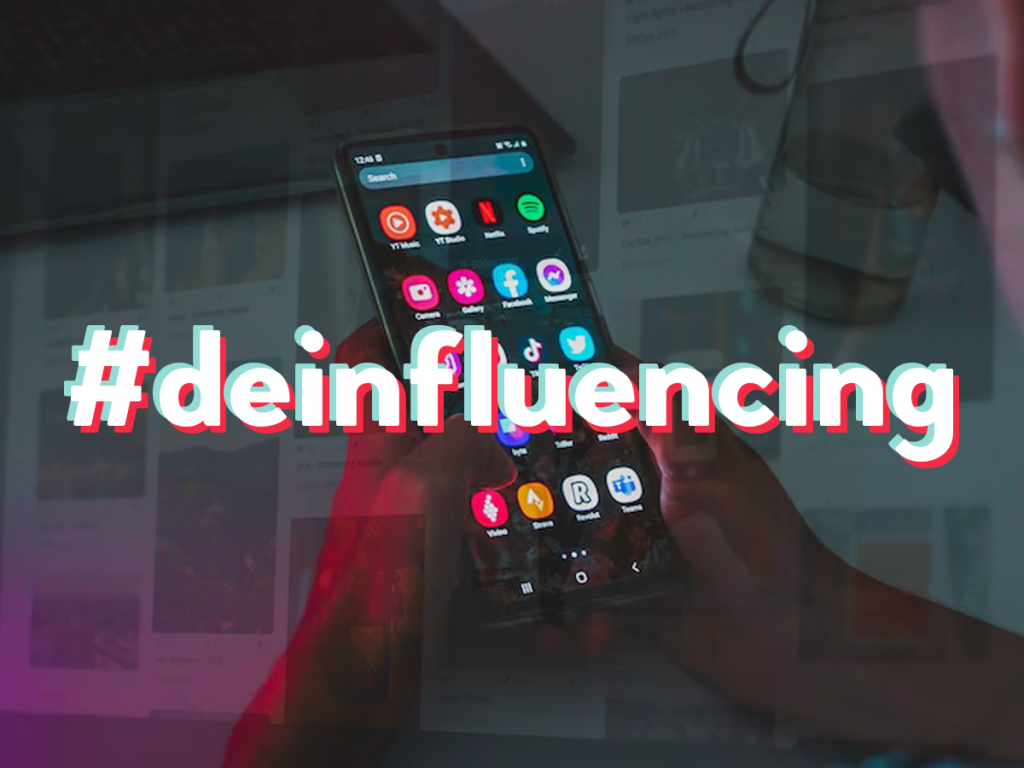Frey Harrod explores the latest trend to swamp TikTok and social media channels: deinfluencing. Is the trend really the saviour from capitalist over-consumption that it proclaims to be?
Most of us who regularly consume TikTok and other social media content can now relate to the experience of watching a video from your favourite creator, only to realise halfway through that it’s a poorly disguised ad for some new random mobile game. In the current Internet climate, YouTube videos dissecting capitalism will be interrupted two minutes in by an ad, and scrolling down your TikTok for-you-page can quickly lead to a £100+ Shein haul.
Influencing has come to dominate the virtual domain, becoming concealed within our everyday media exposure, to the point that it can sometimes even be difficult to distinguish whether we are being influenced or whether something is merely an innocent post. In fact, according to research in consumer trends, 44% of Gen Z have made an impulse purchase of a product purely based off of an influencer’s recommendation.
So, how can we combat this plague of influencer, consumer culture? Well, that’s where Deinfluencing comes in. But what actually is this trend? And what value does deinfluencing have within anti-capitalism?
Ironically, the term ‘Deinfluencing’ has quickly become a massive trend across a variety of social media platforms, garnering over 100 million views on TikTok. As time passes, consumers are becoming more disillusioned to the media they view in their free time, unwittingly being sold products. Thus, frustrations have grown over influencers who recurrently boost products which don’t do quite what they say on the tin in exchange for a neat sum of money or a Brand deal.
MUA Mikayla Nogueira recently experienced the wrath of this consumer frustration after she incited viral controversy for allegedly using false eyelashes during a TikTok she filmed to advertise a new mascara for a Brand deal. Viewers were quick to call her out, and other creators rushed to make videos proving the claims, with some videos on the controversy garnering over 3 million views, such as one by infamous MUA Jeffree Star. Deinfluencing has thus emerged as a powerful trend to combat influencers who increasingly give false endorsements for products, simply for the paycheck. Instead, the trend aims to offer audiences real objectivity and authentic opinions on products and items that influencers have bought or received.
Ultimately, the paradoxical nature of Deinfluencing comes from the fact that the individuals who are ‘deinfluencing’ are typically influencers who may also be benefitting from these viral videos. This content still draws viewers to their account, building a sense of trust with their viewers, and thus may help them in the future if they choose to take on subsequent brand deals or sponsorships. Moreover, by ‘deinfluencing’ one product, these creators will often replace it by raising the reputation of another, thus perpetuating this consumer cycle by heralding their ‘tried and true’ or ‘ride or die’ product.
Nevertheless, the trend certainly says something about capitalism and the growing anti-capitalist sentiment across social media. We are fed up of being consumers, especially when capitalism digs its claws into everything we consume as marketing schemes gradually focus their attention more on social media platforms and the entertainment we passively consume in order to advertise to us. Trends, such as deinfluencing, seem to suggest that, as a society, we are becoming more conscious of our consumer habits, of how companies manipulate and infiltrate our lives, and of how accustomed we have become to over-consumption.
By encouraging people to avoid following micro-trends and buying every new beauty or fashion product their favourite influencer recommends, deinfluencing can have a multitude of benefits, not just environmentally, but personally. Of course, deinfluencing reduces the effects of the environmental catastrophe of consumerism by reducing the amount of landfill created from impulse purchases, as well as reducing unnecessary returns; but by not giving in and purchasing every trend and whim, deinfluencing can also save us money, time, and give us the chance to work out what we actually like and stand for. Wasting time on endless consumption detracts from time which would be much better spent on building up individualism, confidence and authenticity. By breaking free of the cycle of consumption, we allow ourselves the chance to discover what our personal style, tastes and beliefs are, and the sense of confidence over-shopping compensates for emerges naturally.
In the end, no product will ever change your life.
Each new dry shampoo, matte blush or extra-sticky primer is ultimately just another ‘thing’, and the trend of deinfluencing is just another reminder of this. As much as capitalist marketing would have you believe, you do not need three different types of shampoo, and new products are really never that much different from the old ones.
If you’re struggling with deinfluencing your own life and working out what you really need, the method I would recommend is something I call the backpack method. Pretend that you’re going on holiday, and you only have one backpack to bring with you. What do you really need?
You’ll find it’s very little.
Edited by: Rebecca Pearson – Deputy Editor
Header designed by: Meg Crowther


